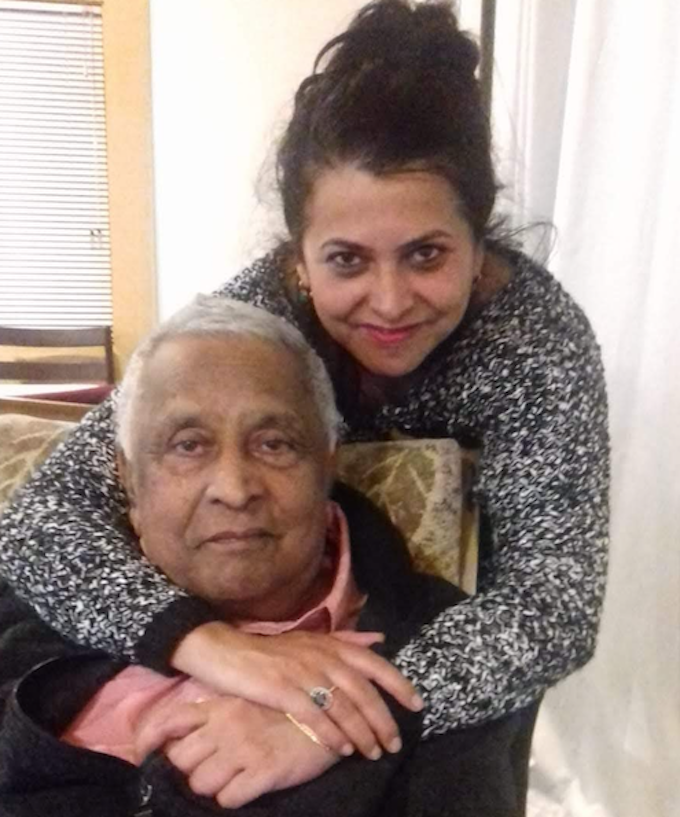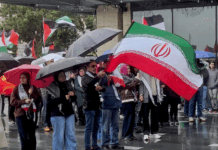OBITUARY: By Helen Nalina Reddy, Jai Ram Reddy’s daughter
“My Fiji
I offer a vision which sees this beloved land of ours united in its diversity, forged out of its adversity, and built on trust. I offer you a vision of Fiji which historians will say that, in the midst of tragedy, we found courage and wisdom, and foresight and determination to lead the nation away from the precipice into a prosperous future. I can only hope that my vision for this most wonderful of nations will fulfil its promise. I can only pray that we who have the moment at hand will find the courage, the strength and the determination to let the past be the past and build a nation that will stand not just to 20/20, but down through the centuries.”
— Jai Ram Reddy, 1993
This moment asks a lot of me and all of us. I write these words with a heavy heart but also a sense of great pride and privilege which is only afforded to me because I happen to be the daughter of the lawyer, judge, and Indo-Fijian statesman, Jai Ram Reddy, who died in Auckland last night aged 85.
Historians, political commentators, and analysts will define their narratives about my father. I am a daughter who simply seeks to celebrate and mark his life and legacy with a personal perspective about him, his legal and political career.
I am conscious that many of those who will read this piece are, like me, the descendants of indentured labourers “Girmitiyas”, who were brought from India to Fiji during colonial rule.
- READ MORE: Dementia tsunami by 2050 ‘likely to hit Pasifika, Māori, Asian communities’
- Indo-Fijian judge and political trailblazer Jai Ram Reddy dies
- Other reports on Jai Ram Reddy
Like many of their generation, my grandparents, Pethi and Yenkatamma Reddy were farming folk who wanted a better future for their children. They worked the field and saved with a view to sending their eldest son, Jai Ram, to study law in New Zealand.
Their dreams were realised, and my father was admitted as a barrister and solicitor in 1960.
Further to his admission to the New Zealand bar, Dad returned to Fiji and enjoyed a long and illustrious career as a lawyer. He was the Minister of Justice and Attorney-General of Fiji (during the short-lived Bavadra Labour government of 1987) and President of Fiji’s Court of Appeal in the early 2000s.
I never did have the opportunity to observe my father in the courtroom, but I have heard and read much about his formidable advocacy skills and forensic legal mind. His areas of practice were broad, but he was particularly invested in criminal law and practice.
Unwavering commitment
I understand he could be a pit-bull in the courtroom and had an unwavering commitment to his clients.
In 2003, the United Nations General Assembly elected Dad as a member of the International Criminal Tribunal for Rwanda (ICTR). He was based in Arusha, Tanzania, and my son and I visited him in 2007.
He was sitting on a bench comprised of two other international jurists, one of whom was the President of the Tribunal, Judge Eric Mose. The four defendants were military men accused of genocide against the Tutsi population in Rwanda during the early 1990s.
On the day we attended his court room, I distinctly recall Dad challenging one of the Canadian advocates on a technical point to which the advocate responded, “Judge Reddy always asks the difficult questions”. He was considered one of the finest judges there.
As a lawyer, I found the proceedings fascinating and as a daughter, I felt very proud.
Of course, none of us are defined solely by our professional life or public profile and it would feel incomplete not to mention some of my father’s other interests. He loved the odd gamble on the horses and as a young child, I recall being dragged to the Ellerslie races on more than a few occasions.
Dad also loved literature, philosophy, and comedy. Those who knew him intimately will recall his reverence for the prose of William Shakespeare and his uncanny ability to recite Shakespearean sonnets and soliloquies — even when his Alzheimer’s was quite advanced.
Interest in philosophy
As a young, idealistic student, he developed an interest in philosophy and his outlook and perspectives were shaped by both Eastern and Western writers and intellectuals. Possessing a dry, acerbic wit, he enjoyed satire and comedy — particularly the British variety — and was an ardent fan of all things involving Monty Python and other comics of that tradition.
He also liked old Hindi songs but loved ghazals the most. He wasn’t the greatest singer but after a couple glasses of red wine, he would sing along to those old melodies with much gusto at dinner parties. It made him happy.
Like all of us, my father’s life was punctuated by both highs and deep sadness. My dear brother Sanjai’s untimely death was devastating for Dad, as it was for all of us. Despite his own grief, he remained a devoted and supportive father and grandfather to his three surviving children and five grandchildren whilse continuing a demanding role as a jurist at the ICTR.
It cannot have been easy in the circumstances. Dad undoubtedly had an intellectual disposition and for much of his life, his interests and preoccupations were principally cerebral in nature. However, with age, he became less preoccupied with such matters and his renowned social reticence, and “short fuse” receded and was replaced by a person who was more relaxed, emotionally accessible and at ease with communicating on a more personal level.
I will treasure the memory of some of conversations we shared in his later years.
As to his political life, Dad was initially a senator in the early 1970s before his election as Leader of the Opposition in 1977. Politically he was a social democrat with liberal instincts. Throughout his long political career, he argued for equity, social justice, and racial equality.
Vehemently opposed to the death penalty on the grounds it offends the inalienable right to life, he, among others, advocated for its abolition in Fiji. He also supported the legitimatisation of same-sex unions and led the parliamentary debate against French nuclear testing in the Pacific.
Committed to multi-culturalism
I suspect; however, my father will ultimately be remembered for his commitment to the values of multi-culturalism and pluralism.
When reflecting on his political legacy, I am cognisant of how urgent and prescient my father’s brand of politics might feel given the rise and global reach of ethnic nationalism and identity politics. Dad firmly believed that leadership in the Fijian context required moral courage, an empathy for “the other” and an acute appreciation of how history and context shaped the political and social fabric of the country.
It is through him; I developed an understanding of the importance of adopting a pluralist approach and working across the political aisle for the greater good of all communities in Fiji.
Similarly, I developed an appreciation of how the colonial legacy of divide and rule cultivated and fostered the deep racial divide, mistrust and communalism which have featured so tragically in Fiji’s political landscape. An appreciation of context is obviously so important, but Dad’s message was that we all share a collective responsibility to reflect, critique and overcome the historical legacies, structures and values which impede the art of empathy and compromise.
Following the military coup of 1987, my father had the singular honour of being the first Indo-Fijian to be invited to speak to the Great Council of Chiefs. It was a seminal moment as Fiji was on the precipice of ratifying a progressive new constitution. In that speech, he talked about the respective fears and interests of both the indigenous Fijian and Indo-Fijian communities.
He also spoke of the importance of power-sharing in the context of a politically and socially fractured Fiji following the military coups in 1987. I quote Dad’s final words from that speech:
“In one of his nation’s darkest hours, that courageous and visionary leader, Franklin Roosevelt, said, and I quote: ‘to some generations much is given; of other generations much is asked. This generation has a rendezvous with destiny.’
“Much was asked of Ratu Cakobau’s generation of Chiefs. Much is asked of this generation of Chiefs. Much is asked of us all.
“Let us therefore gather our courage and set ourselves united to the finishing of the noble task to which our history, our heritage and our motherland now call us. This generation must keep its rendezvous with destiny. And to future generations, much will be given.”
Defining moment squandered
From the perspective of many, that defining moment was squandered and the tragic events which have taken place in Fiji over the past two decades speak volumes. I know how profoundly disappointed my father was that his vision of an inclusive society was mercilessly rebuked by what he described as “narrow-minded partisanship”.
Of course, another military coup then took place, and the rest is history. Notwithstanding those events, may the arc of history bend towards that rendezvous he spoke of on that hopeful occasion.
May his dream of a fully democratised Fiji be realised and let it be a Fiji with fair and accessible rights to political representation, education, and economic parity for all its people.
On this saddest of occasions, it feels fitting to conclude with a quote from that great, visionary civil rights leader Dr Martin Luther King Jr:
“There comes a time when one must take a position that is neither safe, nor politic, nor popular, but he must take it because conscience tells him it is right”.
Rest in Peace my dear father.
Om Shanti
Gole ena vakacegu
Helen Nalina Reddy
London













































Thanks for that wonderful read Helen. Knew Mr Reddyas my political guru and guide and a great mentor. Fiji continues topaya very heavy price for the way we treated him and his vision. Few have or had his level of respect and his stature.
AUM SADGHATI
A must read article about your late father. Back in the days of my undergraduate studies at the University of the South Pacific I had very close classmates of Indo-Fijian extraction. It was through them that I was introduced to your father. Wonderful man, he was. May His Soul Rest in Peace.
Comments are closed.